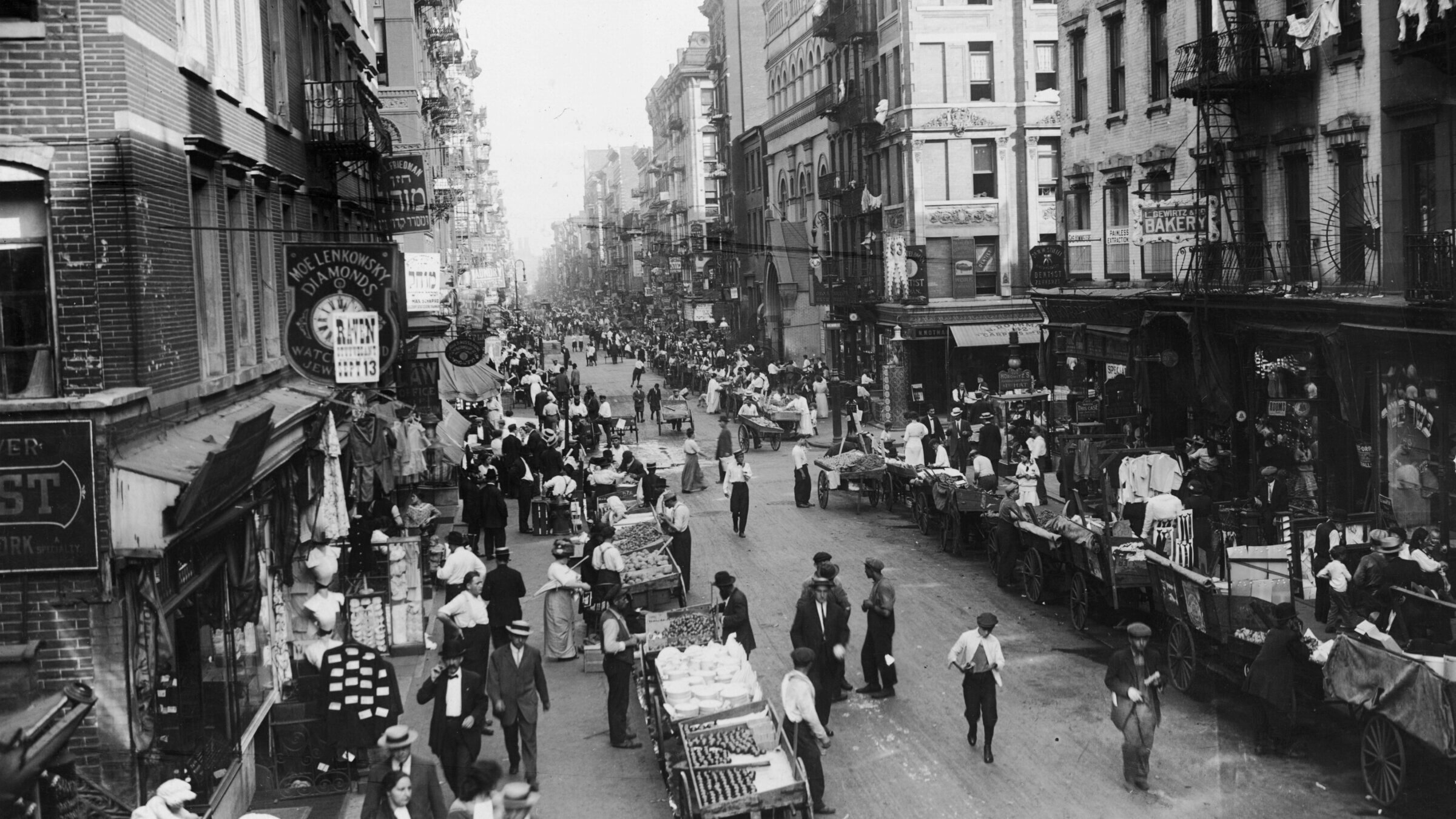An Oedipal tale of sex, violence, crooks, cutthroats and egg creams — set in the Jewish wilderness of the Lower East Side
Henry James makes a cameo appearance in Jerome Charyn’s ‘Ravage & Son,’ though James might not have loved the novel

Delancey Street at the beginning of the 20th century. Photo by Getty Images
Ravage & Son
By Jerome Charyn
Bellevue Literary Press, 288 pp, $17.99
For all the exquisite savor of kishka, gefilte fish, and tongue, it is probably nostalgia more than hunger that draws out-of-towners to Katz’s Deli on East Houston Street. The Lower East Side is, according to historian Hasia Diner, the Plymouth Rock of American Jewish culture, and that swath of southeastern Manhattan is sacred space. The reality, though, is that, for more than 2 million Eastern European Jews who made their way to New York City at the turn of the 20th century, the Lower East Side was a vibrant haven from oppression but also a filthy, congested and perilous slum. According to Clara Karp, a fictional star of the Yiddish stage in Ravage & Son, “It’s row after row of churning streets, where swindlers thrive and families grow poorer every day.”
A beneficent beauty who wows the crowds in her Yiddish rendition of Hamlet, Clara is a beacon of grace amid the crooks and cutthroats who populate Jerome Charyn’s gritty historical crime novel. The prolific author of more than 50 books, including a dozen featuring the Jewish detective Isaac Sidel, Charyn sets the main action of Ravage & Son in 1912, when the circulation of the Jewish Daily Forward is 139,871, and its outspoken editor, Abraham Cahan, is a local potentate known as “the Baron of East Broadway.”
A radical socialist forced to make his peace with capitalism, Cahan recognizes that running ads for White Rose Tea is the price he must pay for his mighty megaphone. He also recognizes that an assimilationist “Yiddish paper with a Yankee accent” is contributing to its own demise. The flood of immigrants is subsiding, and their Americanized children are turning away from Yiddish.
Cahan sponsors a young prodigy, Ben Ravage, he discovered in an orphanage to an education at Harvard College and Harvard Law. After graduation, Ben works as a detective for the Kehilla, an association of wealthy uptown German Jews. Led by the banker and philanthropist Jacob Schiff, the Kehilla is intent on wiping out crime among the unwashed Eastern European immigrants downtown. Assigned to retrieve a wayward daughter of the Jewish aristocracy, Ben runs afoul of his employers when he discovers their own misdeeds. He also mistrusts their collusion with Lionel Ravage, a plumber turned malevolent slumlord of the Lower East Side.
Ben is Lionel’s abandoned, illegitimate son, as well as his rival for the affections of Clara. Ben’s passions for the actress and for justice put him on a collision course with his father, the Kehilla and Tammany Hall. All are willing to employ violence to maintain their authority. Cahan wields the power of the press, but angry editorials do not deter thugs. In an unhappy marriage, with no child of his own, Cahan regards Ben as “as near a son as he’d ever have,” creating a drama of conflicting paternities. Oedipus echoes in the prospect of a fatal confrontation between Ben and his biological father, Lionel, while Clara’s role as Hamlet prepares us for a tragedy of filial revenge.
Inserted as sideshows are a journey into the demimonde of sexual outlaws a century ago and a campaign led by Cahan to keep Frank Woolworth from opening a grand emporium in the neighborhood. Henry James makes a cameo appearance, visiting a downtown café that, addled by the mongrel English he hears, he describes as a “torture-room of the living idiom.” Ravage & Son is not a novel James would love, not only because of its crude cast of pimps, prostitutes, pickpockets, muggers, and slashers. Missing is nuance and ambiguity. Clara has a heart of gold unalloyed by any hint of tin, and Ned Silver, the corrupt bail bondsman who runs the local courthouse, is irredeemably repugnant. Woolworth is merely a greedy entrepreneur.
The historical setting is just a painted backdrop, a pretext for brawny, vibrant pulp fiction. It is New York City stripped of weather, electoral politics, the Automat, and gentiles. What the book does provide is a lurid blend of violence and sex, a dime novel set when ten cents could still buy you a kasha knish and an egg cream — calculated by AI based on an annual inflation rate of 2.5%.
A message from our CEO & publisher Rachel Fishman Feddersen
I hope you appreciated this article. Before you go, I’d like to ask you to please support the Forward’s award-winning, nonprofit journalism during this critical time.
We’ve set a goal to raise $260,000 by December 31. That’s an ambitious goal, but one that will give us the resources we need to invest in the high quality news, opinion, analysis and cultural coverage that isn’t available anywhere else.
If you feel inspired to make an impact, now is the time to give something back. Join us as a member at your most generous level.
— Rachel Fishman Feddersen, Publisher and CEO